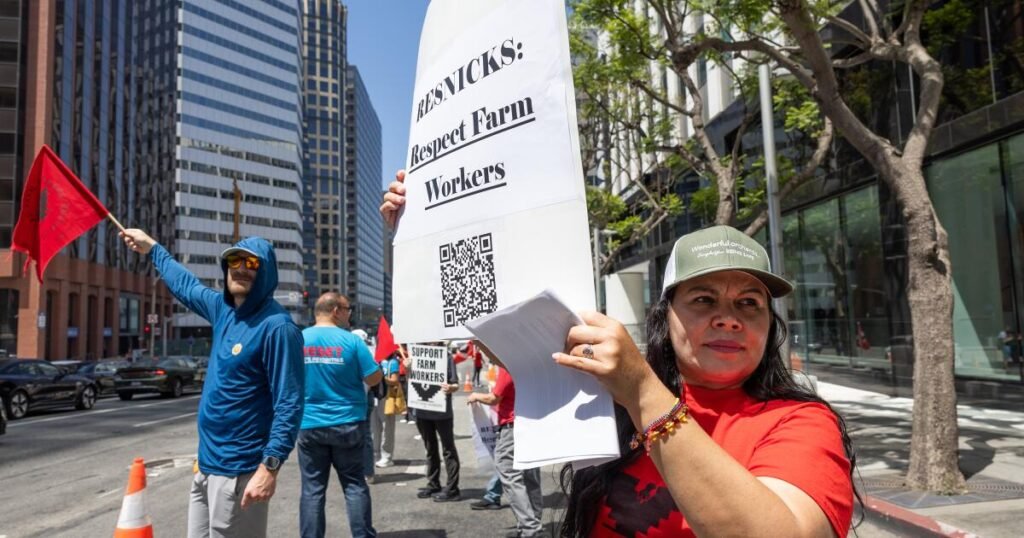Closure of California Grape Nursery Sparks Controversy
One of the major farm employers in California is set to shut down its Central Valley Grape Nursery by the year’s end. This move follows the recent layoffs of hundreds of employees, many of whom supported unionizing efforts among farm workers.
Wonderful Co., owned by billionaires Stewart and Lynda Resnick, has already closed much of its facility in Wasco, located northwest of Bakersfield. They plan to donate the land to UC Davis, as confirmed by a university representative this week.
This decision comes amid ongoing union efforts to represent workers who cultivate grapevines. They’re currently entangled in a struggle against the United Farm Workers (UFW) after a new state law made it simpler for organizers to gain worker signatures. Company representatives claim their decisions are unrelated to the unionization efforts.
“The choice to close such a reputable nursery was made purely for business reasons, not in connection with the UFW or any litigation concerning fraud,” stated company officials.
In February, the nursery’s president, Rob C. Erasber, communicated to employees that the agricultural sector is witnessing the abandonment of numerous orchards and vineyard land. He indicated that the table and wine grape industries are in a deep recession, leading to significant declines in sales and substantial losses for nurseries like theirs. Regrettably, he anticipated no recovery in the near future.
However, some experts and workers raised eyebrows at the timing of the layoffs, noting that they occurred just months after the UFW achieved a significant legal victory in its efforts to organize workers.
Victor Narro, a labor researcher at UCLA, remarked that the closure and donation of the nursery warrant further scrutiny. “Why are they doing this?” he questioned. “Can they really circumvent unionization efforts? Or are these choices based on sound finances?”
While UFW has not openly condemned the strategy of closing farms to retaliate against supportive workers, they have expressed concerns about the layoffs and the recent announcement regarding the nursery’s closure.
At its peak, the 1,400-acre nursery employed around 600 workers—many involved in the negotiation unit—though current figures show only about 100 employees remain. Elizabeth Stratter, the union’s strategic campaign director, noted that workers would still be eligible to apply for positions at other nearby farms, which are reportedly not facing similar cuts.
Although the nursery has suffered significant losses for years, specifics on the duration or extent of those losses have not been disclosed. Unclear is also whether UC Davis will recognize the farm labor union once it takes control of the nursery.
A spokesperson for UC Davis expressed gratitude for the gift, alongside a $5 million start-up donation, stating that an implementation committee will be established to plan the nursery’s future use. While the university respects labor agreements, they indicated that the academic applications of the site differ from its prior operations.
The Resnicks, noted for their substantial donations to political figures and charities, have recently been at the center of unionization efforts. In late July, UFW and other labor organizers protested outside the Hammer Museum, which has benefitted from over $30 million in donations from the Resnicks. This rally followed the release of a video allegedly showing company employees paying individuals to participate in anti-union demonstrations.
The video purportedly depicts anti-union advocates receiving cash payments to discourage unionization efforts. An unedited version of the video was presented during a hearing before an administrative law judge overseeing the state Agricultural and Labor Relations Commission, which has authority over collective bargaining for farm workers.
Wonderful Co. is uncertain about the lawsuit’s implications given the nursery’s closure. However, the board might issue a ruling affecting future disputes.
UFW and Wonderful Co. exchanged accusations last year, with the company alleging misuse of $600 from the COVID-19 Federal Relief Fund to undermine worker organization efforts. In response, UFW has denounced these claims while suggesting that workers were compensated to protest unionization.
Rosa M. Silva, who has worked at the nursery for six years, noted persistent tensions regarding salary increases and benefits among her colleagues. She believes the company seeks to close the nursery to evade negotiations.
In July, she participated in protests, handing out flyers urging the billionaires of the wonderful company to respect farm workers. “If we can donate millions to a museum most workers will never visit, why can’t we receive fair wages in return for our hard work?” she posed during the protest.
UFW filed a petition with the Labor Commission earlier this year, claiming that most of the nursery’s 600-plus workers signed authorization cards recognizing them as their union representatives. This marked what appeared to be UFW’s third success in union drives over recent months, following a downturn in membership levels.
Under the state’s law, unions can now gather authorization cards from farm workers at offsite meetings without notifying employers—a departure from previous practices requiring secret votes at designated polling places. This law has bolstered union efforts across various farms.
Wonderful has since taken legal action against the state to contest the card check law, with a Kern County judge ruling the recognition process unconstitutional—a decision later overturned by the Court of Appeals in October.
Ana Padilla, executive director of the UC Merced Community and Labor Center, noted that Central Valley has faced a proliferation of anti-union messaging since the card check law was implemented. She expressed doubts about the nursery’s closure, positing that such actions are part of an anti-union strategy.







